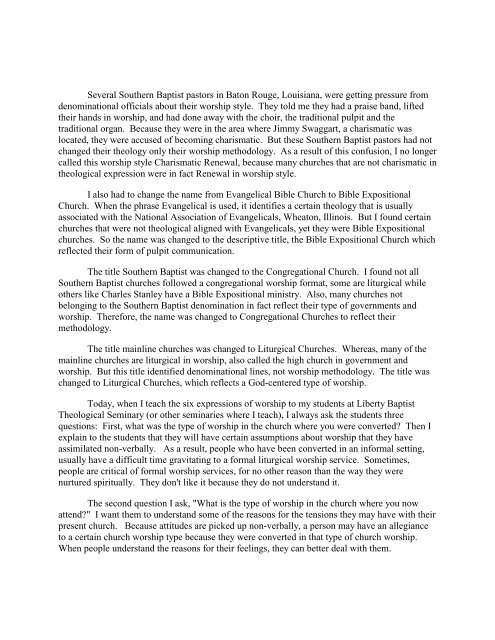PUTTING AN END TO WORSHIP WARS - Elmer Towns
PUTTING AN END TO WORSHIP WARS - Elmer Towns
PUTTING AN END TO WORSHIP WARS - Elmer Towns
- TAGS
- worship
- elmer
- towns
- elmertowns.com
Create successful ePaper yourself
Turn your PDF publications into a flip-book with our unique Google optimized e-Paper software.
Several Southern Baptist pastors in Baton Rouge, Louisiana, were getting pressure from<br />
denominational officials about their worship style. They told me they had a praise band, lifted<br />
their hands in worship, and had done away with the choir, the traditional pulpit and the<br />
traditional organ. Because they were in the area where Jimmy Swaggart, a charismatic was<br />
located, they were accused of becoming charismatic. But these Southern Baptist pastors had not<br />
changed their theology only their worship methodology. As a result of this confusion, I no longer<br />
called this worship style Charismatic Renewal, because many churches that are not charismatic in<br />
theological expression were in fact Renewal in worship style.<br />
I also had to change the name from Evangelical Bible Church to Bible Expositional<br />
Church. When the phrase Evangelical is used, it identifies a certain theology that is usually<br />
associated with the National Association of Evangelicals, Wheaton, Illinois. But I found certain<br />
churches that were not theological aligned with Evangelicals, yet they were Bible Expositional<br />
churches. So the name was changed to the descriptive title, the Bible Expositional Church which<br />
reflected their form of pulpit communication.<br />
The title Southern Baptist was changed to the Congregational Church. I found not all<br />
Southern Baptist churches followed a congregational worship format, some are liturgical while<br />
others like Charles Stanley have a Bible Expositional ministry. Also, many churches not<br />
belonging to the Southern Baptist denomination in fact reflect their type of governments and<br />
worship. Therefore, the name was changed to Congregational Churches to reflect their<br />
methodology.<br />
The title mainline churches was changed to Liturgical Churches. Whereas, many of the<br />
mainline churches are liturgical in worship, also called the high church in government and<br />
worship. But this title identified denominational lines, not worship methodology. The title was<br />
changed to Liturgical Churches, which reflects a God-centered type of worship.<br />
Today, when I teach the six expressions of worship to my students at Liberty Baptist<br />
Theological Seminary (or other seminaries where I teach), I always ask the students three<br />
questions: First, what was the type of worship in the church where you were converted? Then I<br />
explain to the students that they will have certain assumptions about worship that they have<br />
assimilated non-verbally. As a result, people who have been converted in an informal setting,<br />
usually have a difficult time gravitating to a formal liturgical worship service. Sometimes,<br />
people are critical of formal worship services, for no other reason than the way they were<br />
nurtured spiritually. They don't like it because they do not understand it.<br />
The second question I ask, "What is the type of worship in the church where you now<br />
attend?" I want them to understand some of the reasons for the tensions they may have with their<br />
present church. Because attitudes are picked up non-verbally, a person may have an allegiance<br />
to a certain church worship type because they were converted in that type of church worship.<br />
When people understand the reasons for their feelings, they can better deal with them.
















